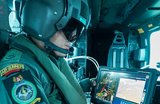Poland orders COSMO-SkyMed ground segment
Telespazio and Thales Alenia Space have signed an agreement with the Italian Ministry of Defence to supply the ground segment of the COSMO-SkyMed satellite network to the Polish Ministry of Defense.
The $33.79 million contract is part of an agreement between the Polish and Italian defence ministries signed in 2012. The agreement was for Poland to take on a significant role in the second-generation COSMO-SkyMed programme and build an associated user segment in the country.
Thales Alenia Space Italia will act as lead company for the contract, on behalf of a temporary consortium which includes Telespazio.
The contract concerns the ground segment to be delivered to Poland to allow access to COSMO-SkyMed data. The Polish Defense User Ground Segment (P-DUGS) will be able to request images, receive satellite data and generate and store different types of products. It will be an integral part of the overall COSMO-SkyMed ground segment, based on its modular, scalable design.
P-DUGS will be implemented in two phases. The first phase is planned for late 2016 or early 2017 and will enable access to first-generation satellites. The second phase is planned for between the end of 2017 and early 2019 and will add access to second-generation satellites.
The first generation comprises a constellation of four satellites, equipped with radar sensors capable of operating under any atmospheric and visibility conditions and featuring a very high revisit frequency. COSMO-SkyMed was designed to meet both defense and civil requirements.
Related Equipment in Defence Insight
More from Digital Battlespace
-
![Thales looks to boost DigitalCrew system through AI and human-machine teaming trials]()
Thales looks to boost DigitalCrew system through AI and human-machine teaming trials
The Thales DigitalCrew package, first unveiled at last year’s Defence IQ International Armoured Vehicles conference, is designed to merge imaging and apply a layer of decision-making and observation algorithms to support crew and other personnel.
-
![Babcock nears first customer for Nomad AI translation tool]()
Babcock nears first customer for Nomad AI translation tool
Nomad can provide militaries with real-time intelligence, saving critical time on the battlefield.
-
![AUSA 2025: Israel’s Asio Technologies to supply hundreds of improved Taurus tactical systems]()
AUSA 2025: Israel’s Asio Technologies to supply hundreds of improved Taurus tactical systems
Taurus operates alongside the Israel Defense Forces’ Orion system which supports mission management across tens of thousands of manoeuvring forces, from squad leaders to battalion commanders.
-
![AUSA 2025: Kopin pushes micro-LED plans as China moves faster]()
AUSA 2025: Kopin pushes micro-LED plans as China moves faster
The plan for the new displays follows fresh investment in Kopin’s European facilities by Theon and an order for head-up displays in fielded aircraft, with funding from the US Department of Defense.
-
![AUSA 2025: Persistent Systems to complete its largest order by year’s end]()
AUSA 2025: Persistent Systems to complete its largest order by year’s end
Persistent Systems received its largest ever single order for its MPU5 devices and other systems earlier this month and has already delivered the 50 units to the US Army’s 4th Infantry Division.

























